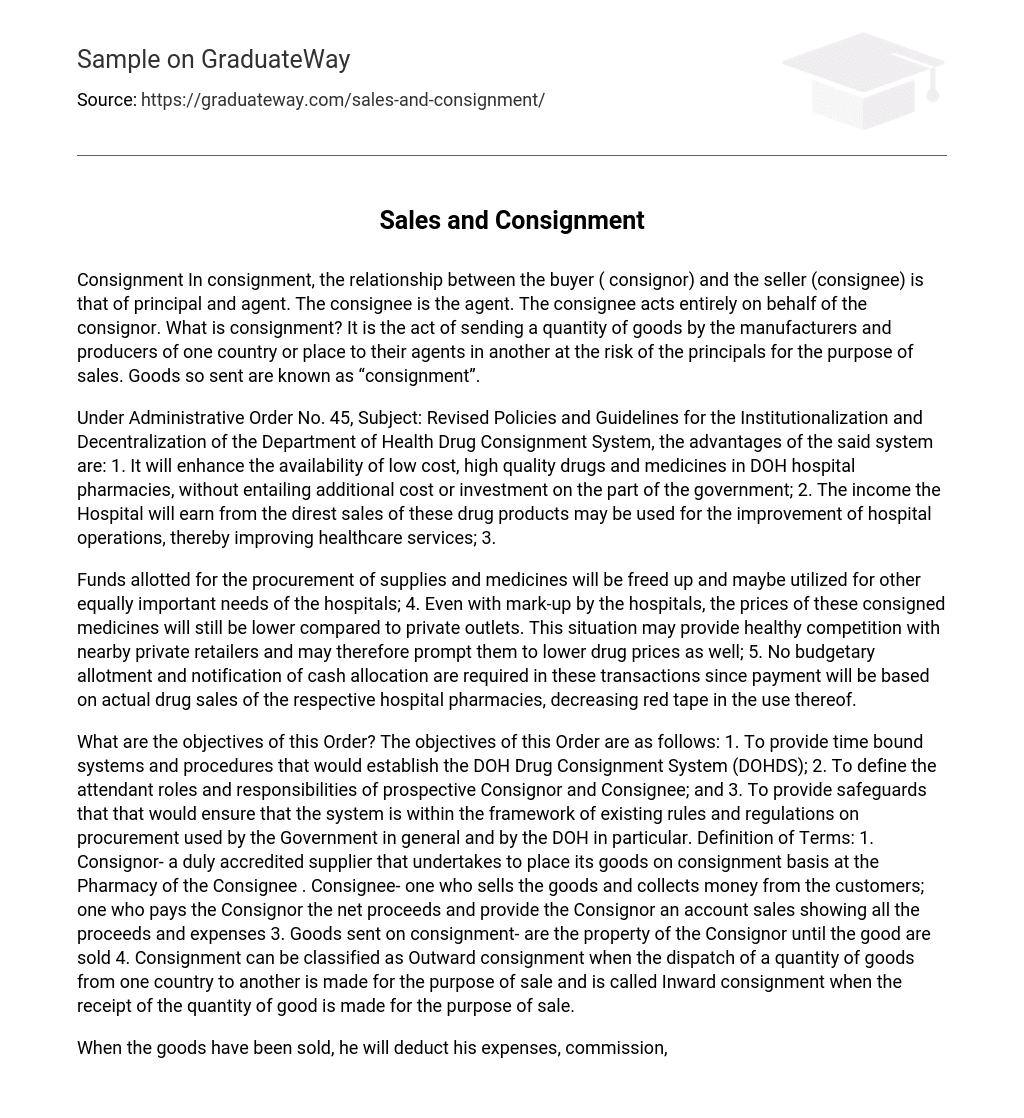Consignment In consignment, the relationship between the buyer ( consignor) and the seller (consignee) is that of principal and agent. The consignee is the agent. The consignee acts entirely on behalf of the consignor. What is consignment? It is the act of sending a quantity of goods by the manufacturers and producers of one country or place to their agents in another at the risk of the principals for the purpose of sales. Goods so sent are known as “consignment”.
Under Administrative Order No. 45, Subject: Revised Policies and Guidelines for the Institutionalization and Decentralization of the Department of Health Drug Consignment System, the advantages of the said system are: 1. It will enhance the availability of low cost, high quality drugs and medicines in DOH hospital pharmacies, without entailing additional cost or investment on the part of the government; 2. The income the Hospital will earn from the direst sales of these drug products may be used for the improvement of hospital operations, thereby improving healthcare services; 3.
Funds allotted for the procurement of supplies and medicines will be freed up and maybe utilized for other equally important needs of the hospitals; 4. Even with mark-up by the hospitals, the prices of these consigned medicines will still be lower compared to private outlets. This situation may provide healthy competition with nearby private retailers and may therefore prompt them to lower drug prices as well; 5. No budgetary allotment and notification of cash allocation are required in these transactions since payment will be based on actual drug sales of the respective hospital pharmacies, decreasing red tape in the use thereof.
What are the objectives of this Order? The objectives of this Order are as follows: 1. To provide time bound systems and procedures that would establish the DOH Drug Consignment System (DOHDS); 2. To define the attendant roles and responsibilities of prospective Consignor and Consignee; and 3. To provide safeguards that that would ensure that the system is within the framework of existing rules and regulations on procurement used by the Government in general and by the DOH in particular. Definition of Terms: 1. Consignor- a duly accredited supplier that undertakes to place its goods on consignment basis at the Pharmacy of the Consignee . Consignee- one who sells the goods and collects money from the customers; one who pays the Consignor the net proceeds and provide the Consignor an account sales showing all the proceeds and expenses 3. Goods sent on consignment- are the property of the Consignor until the good are sold 4. Consignment can be classified as Outward consignment when the dispatch of a quantity of goods from one country to another is made for the purpose of sale and is called Inward consignment when the receipt of the quantity of good is made for the purpose of sale.
When the goods have been sold, he will deduct his expenses, commission, etc. , from the sale proceeds and the balance is remitted to the Consignor. 5. Nature of Consignment- if the owner of the goods does not have retail outlets he can consign the goods to an agent and the agent will sell the goods for him and receive a commission in return 6. Registration certificated-A certificate issued by the DOH which that indicating that a supplier is listed in the Simplified Supplier Registry System(SSRS) . Consigned Drugs and Medicines-Drugs and medicines which the consignor delivers to the Consignee under a consignment agreement 8. Replenishment Drugs and Medicines-Drugs and medicines which the Consignor delivers to the Consignee as replenishment for those previously sold by the Consignee, which expiration date results to a remaining shelf-life not allowed by DOH, or as replacement to delivered goods, which deterioration are beyond the control of the Consignee. 9.
Consignment Order-Consignee-accomplished form, which directs the Consignor to effect the delivery of specific drugs and medicines with corresponding required quantities as determined by the Consignee within the applicable period of time 10. Prevailing Market Price-Average price of a drug obtained from at least 3 leading drugstore chains, i. e. those endowed with natural economies of scale for bulk procurement, within an administrative region and within the month a price offer is submitted or as determined by National Drug Policy Staff Essential Drug Price Monitoring Unit





